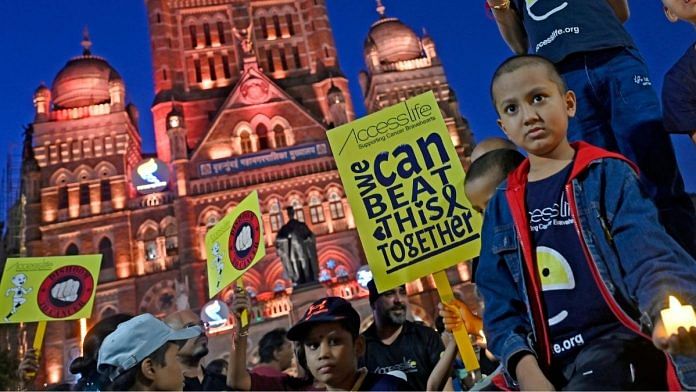New Delhi: Last week, the first ‘living drug’ in India received approval, marking a significant milestone in the country’s cancer care landscape.
The Central Drugs Standard Control Organisation (CDSCO), on 13 October, approved the first CAR (Chimeric Antigen Receptor) T-cell therapy — a cutting-edge immunotherapy developed by ImmunoACT, a company incubated at the Indian Institute of Technology Bombay, for the treatment of leukemia and refractory or relapsed lymphoma (cancers of the lymph system).
CAR T-cell therapy for treating specific types of cancer was first approved in the US in 2017 and, as of now, 6 therapies by various drugmakers have been approved by the US Food and Drug Administration (FDA). Since the therapy uses a patient’s own genetically engineered cell to target cancer, it is also called a “living drug”.
In the US, this therapy costs about $400,000 or nearly Rs 3.3 crore, for every patient.
The therapy by ImmunoACT, named NexCAR 19 (Actalycabtagene autoleucel), however, has been indigenously developed in collaboration with the Tata Memorial Centre (TMC).
ImmunoACT has tied up with around 20 hospitals — public and private — in India so far, and patients are already registering for the therapy. The company plans to make it available to Indian patients at about Rs 30-40 lakh. Its CEO Rahul Purwar told ThePrint that the clinical data from phase 1 and 2 indicates nearly 70 percent overall response rate in about 60 patients — young adults and adults — in whom it was tested.
“The safety profile in terms of cytokine release syndrome (CRS) and absence of neurotoxicity indicates a significant improvement over the other commercially approved CD19-directed (type of T cells) CAR T-cell therapies,” he added.
Immuneel Therapeutics — a biotech start-up backed by Biocon founder Kiran Mazumdar Shaw and US-based oncologist-author Dr Siddhartha Mukherjee — which has tested its CAR T-cell therapy in about 24 patients in India, is also waiting for the market authorisation of the product from the CDSCO, sources told ThePrint.
ThePrint explains how this novel therapy works, how NexCAR 19 is different from other CART T-cell therapies available in developed countries, what may be therapy’s limitations and significance in cancer care regime.
Also read: China study links skipping breakfast to increased cancer risk. Need more proof, say Indian doctors
Advanced form of immunotherapy
Immunotherapies for cancer, through which monoclonal antibodies — special types of proteins called antibodies which are made in laboratories — are infused in patients, have been around for nearly two decades.
“But in case of CAR T-cell therapy, a type of white blood cells called T-cells are taken out from a patient’s body through a process called apheresis and are genetically engineered to recognise the cancer cells, multiply faster and stay for longer duration in a patient’s body,” said Dr Hasmukh Jain, an oncologist with TMC in Mumbai who led the clinical trials.
“Following genetic engineering, during which scientists engineer the T-cells by adding a manufactured CAR (disarmed virus that delivers DNA sequences required to alter T-cells), the converted T-cells (CAR T cells) can target a specific protein on the cancer cells,” he said. “These changed T-cells grow and multiply in the lab. Once there are enough cells, patients are given an infusion containing these cells back into their bloodstream.”
The whole process can take several weeks and is carried out in a hospital setting under close medical supervision.
Purwar pointed out that a major advantage with NexCAR 19, in comparison to the other CAR T-cell therapies available abroad, is that it uses more ‘humanised’ CAR, rather than murine (derived from mouse) CAR, which are used in genetic re-engineering of T-cells.
“As a result, the chance of neuro-toxicity (changes in the nervous system), which is a common side-effect of CAR T-cell therapies, is far less with our product,” he said.
According to Dr Mandeep Singh Malhotra, director of surgical oncology at CK Birla Hospital, Delhi, while most patients experience minimal side effects, some may encounter phenomena like cytokine release (which can sometimes be life-threatening) and other adverse effects such as raised risk of infection, which can also occur with various immunotherapy or monoclonal antibody treatments.
“Also, it’s important to note that CAR T cell therapy is still relatively expensive, and more research, innovation, and efforts to make it more accessible to the broader population are necessary,” he said.
Hope for the future
For now, CAR T-cell therapy is indicated only in patients in whom there is a relapse of blood cancers or lymphoma. However, some recent studies have shown that it was better than standard treatment in case of specified cancers after their initial or first-line chemotherapy.
Studies have also shown that the results with the therapy are slightly better in the case of the pediatric population.
“Also, research is currently underway to analyse whether the treatment with CAR T-cell therapy can be provided in case of autoimmune diseases such as lupus, multiple sclerosis, rheumatoid arthritis,” a senior gene therapy researcher told ThePrint told ThePrint.
The researcher added that clinical trials are also on to understand the therapy’s usefulness for solid tumors such as cancers of breast, kidney and lungs.
Further, the researcher stressed that going ahead, CAR T-cell therapy has the potential to emerge as the fifth pillar of cancer care, after chemotherapy, surgery, radiation therapy and targeted therapy.
(Edited by Zinnia Ray Chaudhuri)
Disclosure: Kiran Mazumdar-Shaw is among the distinguished founder-investors of ThePrint. Please click here for details on investors.
Also read: US lawsuit settlement puts spotlight back on ranitidine. India still undecided on ‘cancer-risk’ drug



